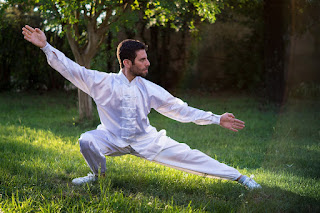8 Exercises for Healthier Thinking and Memory
The benefits of exercise are well-known for the body, but
a growing body of research is finding that it also has effects on the brain.
Aerobic exercise, such as running or swimming, is known
to boost the levels of BDNF (brain-derived neurotrophic factor) in the brain.
Other types of exercise are also thought to have beneficial effects.
Swimming
Swimming is a great exercise for your brain because it
requires concentration on breathing and helps to reduce stress. It can also
boost serotonin levels, a hormone known to help you manage your depression and
anxiety.
In addition, swimming improves your memory and mood as
it boosts blood flow to your brain. Quality blood flow is essential for healthy
brain function and can protect your brain from harmful toxins.
Another way that swimming can benefit your brain is by
helping to repair damage caused by stress. In a previous study, researchers
found that hippocampal neurogenesis (or the growth of new neurons) occurred in
depressed rats after they took up swimming.
Research has also shown that swimming increases the
density of neuronal spines in the brain, which is believed to contribute to
better memory and mood. The density of neuronal spines can help neurons build
new connections, and send signals to other nerve cells more effectively.
Cycling
Cycling is often seen as a workout that boosts physical
health, but science also shows that it can help build your brain. This is
because it boosts the production of proteins, such as Noggin and BDNF
(brain-derived neurotrophic factor), which help stimulate the growth of new
neurons.
 Moreover, studies have shown that exercise helps
alleviate stress and improves mental health. One study found that people who
rode bikes for 15 minutes had a decline in their levels of cortisol, a stress
hormone.
Moreover, studies have shown that exercise helps
alleviate stress and improves mental health. One study found that people who
rode bikes for 15 minutes had a decline in their levels of cortisol, a stress
hormone.
It also stimulates the hippocampus, which is associated
with memory and learning. Another study found that cycling outdoors boosted
cognitive performance in older adults.
The physical activity of cycling also increases blood
flow to the brain, delivering oxygen and nutrients that help promote cognitive
function. Researchers believe that this vascular brain change is key to the
cognitive benefits of biking.
Riding also encourages mindfulness, which has been
shown to reduce stress, depression, and anxiety. It’s also a great way to get
outdoors and explore new scenery, both of which can boost your mood.
Yoga
Yoga is an ancient mind and body practice combining physical
postures, rhythmic breathing and meditation to help practitioners achieve a
holistic health experience. While the physical exercise component of yoga has
been linked to improved heart and lung health, recent research has revealed
that it could also boost brain function.
According to one study, yoga practice increases gray
matter volume in the hippocampus and frontal regions of your brain. Moreover,
it thickens your cortical thickness, which is key to cognitive function.
Another study found that people who practice meditation
tend to have a cooler response to stress, which helps them stay calm and
collected in tough situations. Similarly, those who attend retreats that
involve religious practice and prayer also experience positive brain changes.
Using neuroimaging techniques like magnetic resonance
imaging (MRI), functional MRI (fMRI) and single-photon emission computed
tomography (SPECT), researchers have been able to observe the positive effects
of yoga on the structure, function and cerebral blood flow of brain regions
including the prefrontal cortex, amygdala, hippocampus, cingulate cortex and
brain networks, including the default mode network (DMN). These studies show
that regular practice of yoga can reduce your risk of age-related brain health issues
and improve memory problems and dementia.
Tai Chi
Tai Chi is a gentle, slow exercise that can help
improve your brain health. Various studies have shown that it can reduce stress
and improve mental health, which can make you feel more alert and energized.
It also helps calm your mind and lower your fear of
falling. This can help prevent falls and injuries.
Another study found that tai chi improves your ability
to focus and concentrate, which can increase your mental sharpness. It also has
a positive effect on your energy levels and encourages a healthy sleep cycle.
Besides, tai chi can reduce your risk of dementia and
Alzheimer’s disease. A recent study found that people who practiced tai chi for
one year were less likely to develop dementia than those who did not.
It’s no wonder that so many people are interested in
learning more about the benefits of tai chi. It’s an effective exercise that
can benefit all ages and is especially beneficial for those with physical
limitations, such as chronic pain or illness. It also encourages a healthy diet
and is low impact, so it’s a great way to get moving while staying safe and
healthy.
Pilates
Pilates, which focuses on core strength and
flexibility, can improve mood and cognitive function. It can help you focus and
relax, and it can even increase endorphins, the body's "feel-good"
chemicals.
Researchers have also studied how Pilates can reduce
rumination, a common characteristic of depression. Rumination is when you spend
a lot of time thinking about negative thoughts and feelings, which can lead to
a cycle of negativity and low mood.
The inward focus of Pilates can help break that cycle,
says Anne Bishop, a Pilates instructor in Petaluma, California. She teaches her
students to notice sensations produced by every movement and to coordinate
their movements with their breathing.
She also stresses the importance of mindfulness. She
explains that when you focus on your body, you're less likely to wander into
your work or other responsibilities and can instead focus on the present
moment.
Breathing is a key component of most meditative
practices, such as yoga and meditation. It's important to practice regulated
breathing during Pilates, because it helps you regulate your emotional states
and responses to stress.
Dancing
Dancing is a great way to get your heart rate up, but
it also helps improve brain health. Studies have shown that dancing can reduce
your risk of Alzheimer's and dementia, and it's a great form of exercise for
anyone looking to boost their mental acuity.
 One of the main reasons that dancing is so good for
your brain is because it stimulates your hippocampus, which is the part of your
brain that processes emotions and memory. Keeping your hippocampus active is
critical for preventing cognitive decline and dementia.
One of the main reasons that dancing is so good for
your brain is because it stimulates your hippocampus, which is the part of your
brain that processes emotions and memory. Keeping your hippocampus active is
critical for preventing cognitive decline and dementia.
Another reason that dancing is a great brain booster is
because it stimulates the reward circuit in your brain. This circuit is
involved in the production of neurochemicals that trigger a feeling of
pleasure.
In addition, dancing teaches you to focus on your
movements and choreograph them, which is a great way to train your brain. It's
also a social activity, which means that you're constantly engaging your brain
and fostering new relationships.
Interval Training
This is a form of exercise that alternates between
periods of sudden and intense activity and periods of lowered intensity and
activity. It
can be incorporated into a variety of workouts, including running, cycling,
swimming, and weight training.
In terms of brain health, research shows that intervals
that are short in duration and repeated at high-intensity levels boost BDNF
signaling. Studies also show that HIIT increases brain function and reduces
stress.
Interval training is a great way to increase the number
of calories you burn in a workout and improve your endurance. In addition, it
can help your heart and circulatory system become stronger. This makes your
body more efficient at recovering from intense exercise, which can lead to
improved muscle growth and a higher metabolism.
Strength Training
Strength training, also called weight training or resistance training, is an effective form of exercise that can improve brain health and increase overall physical fitness. The major muscle groups need to contract slowly against an external force, typically fitness equipment or free weights.
It also increases blood flow to the brain and decreases the risk of
dementia. In one study, researchers found that strength training can slow the
degeneration of the hippocampus, a region of the brain crucial for memory
function.
In addition, weightlifting has been shown to halt the
development of age-related lesions in the brain's white matter -- the nerve
fibers that link together different areas of the brain. These lesions tend to
grow as people get older and can reduce mental acuity.
Like aerobic exercise, strength training stimulates the
brain's pituitary gland to release endorphins and a protein called brain-derived
neurotrophic factor (BDNF), both of which can help improve mood. However, you
need to monitor how your strength training routine affects your mood and
confidence and adjust accordingly.











Comments
Post a Comment